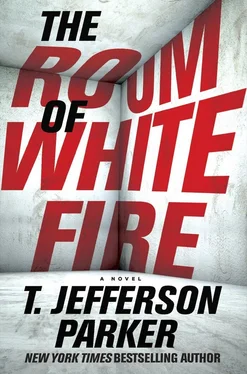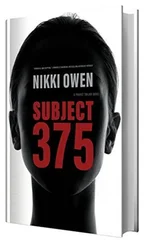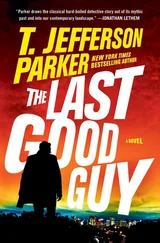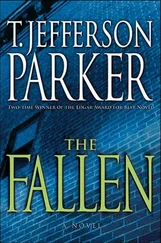Past Donald T.’s shoulder I saw Rivers and Hoffman moving toward DeMaris, who was at the T — Z table, talking to the dispensing nurse. The quarterback and pitcher had a sense of purpose about them. Rivers had his helmet back on.
“I also know you want to get him back here,” I said. “It would really help if I knew what drugs he was taking, and how often, and what happens when he stops.”
“Talk to Hulet. She prescribes them.”
Rivers and Hoffman had come to a stop twenty feet or so behind DeMaris. Rivers cleared the patients around him. They cooperated, standing aside, waiting and watching. DeMaris continued his conversation with the nurse. Hoffman lowered his cap and looked in for the sign. He shook it off, then another. Into the stretch. A glance to first. Then, with a high leg kick and a practiced turn of body, he fired a green juice can.
Donald saw my expression and sensed something amiss, turning just before DeMaris wheeled around and the can flew past his head. DeMaris charged the mound. The security men crashed in from the peripheries. Shouts and shrieks blotted out the music.
Donald jumped and his chair clattered to the floor. Elbows up, he barged through the throng of patients who were closing in on the action. Rivers stepped into the pocket and bounced a green bullet off DeMaris’s chest.
When the first security guard got to Hoffman, the reliever screwed himself into a martial arts fighting stance, yelped, kicked, and missed. The goon pulled up short and raised his hands for order, but Dressed for Golf issued a weirdly savage war whoop and tried to tackle him. The security man threw him to the floor and Hoffman piled on. Then Donald. The tiny old ballerina clenched her fists to her chin and screamed.
DeMaris slammed into Rivers, carried him along for five yards, then crashed him onto table A — G. The drink bucket jumped and the cans and ice sloshed out and the snacks and flowers popped into the air.
I set my Union-Tribune over Morpheus’s tablet, picked up paper and computer together, and walked toward the nearest exit. I turned to see three big security men bury DeMaris and Rivers in a mountain of white. Cries and cheers and laughter from the crowd. An alarm wailing and fire sprinklers raining down.
Back in Clay’s room I searched the tablet and found his formulary for the last three years. Not wise to send any of it to the Arcadia security printer, so I used my phone to photograph the tablet screens and email the pictures to my office. Took me a while, with my big man’s fingers and my heart loping right along. Kept waiting for Donald or DeMaris to walk in on me. When I was finally done I wiped down Morpheus’s tablet and wrapped it in the newspaper. Then sent another message to Sequoia.
2:28 PM
Talk to me.
By the time I got back to the Lyceum the med-break tables had been righted and rearranged, the chairs pushed back to one wall. Two all-whiters with shop vacuums slurped up the fire-sprinkler water from the carpet. I chose my moment, set the tablet and newspaper on Donald T.’s table, then headed back to security to pick up my printouts.
Enjoy the show, Ford?” asked DeMaris. His coat and tie were gone and his white shirt was stained with what looked like fruit punch.
“Clutch tackle.”
“Linebacker, Florida State,” he said. “Around here, you think everything’s fine, then the nuts go nuts. They’re strong. Fuckin’ lunatics are always strong.”
DeMaris led me through a small lobby, then into a roomful of monitors. An all-whiter sat at a booth well back from the screens, a control console before him, eyes up. With twenty-four cameras going, he had plenty of Arcadia to keep track of. Most of the locations were interior, but the pool area and some of the outside grounds were video-covered, too.
In the next room a woman sat at what looked like a studio mixing board, with speaker buds in her ears and a very large digital recorder on the desk in front of her.
“How many mics?” I asked DeMaris as we passed through.
“Classified. And quiet, please.”
“It’s my job to ask questions.”
“I can’t believe Spencer doubled your pay.”
“And I don’t even get pelted with juice cans.”
“I looked at the stuff you printed from Clay’s computer,” he said. “If it was up to me, I wouldn’t let you take any of it. I wouldn’t even let you in here.”
“Just follow orders and keep the cash coming.”
He stopped and turned and looked at me. “Things will get settled between us. Don’t worry.”
He opened the door to a smaller back room, where Paige Hulet stood near a printer stand, flipping through a sheaf of paper.
“Pardon the riot,” she said. “It’s unusual here.” A strand of her hair had come loose from the usual tight knot to dangle out of her vision. I’d never seen her so recklessly presented. She must have felt the coil bobbing because she pushed it back into place, but it fell out again.
“Your partners sure take a lot of drugs,” I said.
“You know why we prescribe them, don’t you? Because they work. Laypeople don’t realize that lithium beats cold-water dunks and straitjackets every time.”
“I’m lay as they get. So I may have some questions about those drugs.”
“I can answer them. We’ve come a long way in treating mental illness, Mr. Ford. But we’re not perfect.”
I considered her, felt that basic instinct a person can only resist with effort. It had been building for some time, since that first day I’d tried to move her out of the sun and lost my cool. Now I made no effort at all to resist. “You’re pretty close.”
She stared back, her eyes forceful against mine. “I haven’t been accused of that for a while.”
Her eyes pried, then loosened into skepticism. I stepped closer, into that space where everything changes. Her eyes drew in the light and threw it back. There was a very small flaw in her iris.
“I know what happened to your wife, Mr. Ford. From the news. I’m very sorry.” She held out the papers and I took them. She made another long appraisal of me. “And I accept your invitation. The dance thing.”
I set the papers on a table, moved closer still, put my right hand just above her hip.
“No, definitely not now,” she said. “This is highly insecure. For us being in security, I mean. I could lose my job.”
“No you couldn’t. We’re model citizens.”
I waltzed her around the small room — one two three, one two three — my favorite dance, barely missing the desks and tables, really just an extended version of my moving her out of the sunlight that first day we’d met, and her moving us back into it, which had prompted her confession of the five-year dance drought, which had quietly thrilled me, and led directly to my invitation, which had led to this. We were clunky at first, opposing forces, but we evolved. The small of her waist fit full in my hand, and her weight, once I gained her trust, shifted easily with mine, and her scent, so much a woman’s, went straight into my thick male skull. She held her cheek almost to my chest. One two three. It was odd and good to dance in silence. Justine in our bedroom. Memories bouncing off the present. Sometimes dancing feels like flying. Then she pushed me away, gently but firmly. “Take me dancing sometime. Properly.”
My phone rang and I recognized the number. “Hello, Mr. Vazquez.”
“Clay is on his way here.”
John Vazquez lived in Redwood Valley, 60 miles inland from the Mendocino coast and 124 miles north of San Francisco. He told me he had served with Clay during the war in Iraq but didn’t say where. He was now managing a large vineyard owned by Briggs Spencer. The property had an airstrip and a helipad. Vazquez gave me the GPS coordinates, said he’d meet me on the strip.
Читать дальше












